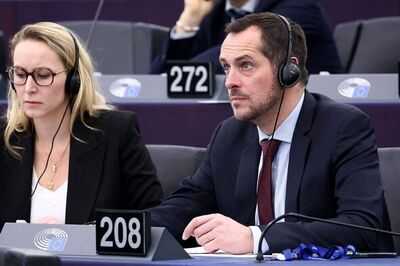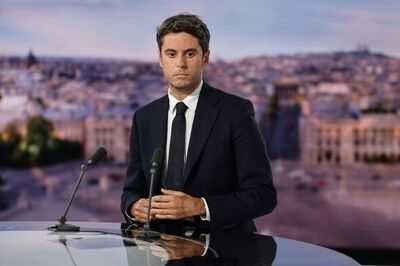
Emmanuel Macron faces mounting pressure after another prime minister's resignation, with a senior right-wing critic accusing the French President of economic mismanagement and insisting his reluctance to quit will simply prolong national instability. Nicolas Bay MEP further warned that Mr Macron's "ego" makes resignation unlikely, describing the president's era as a "parenthesis that is closing" and calling for a right-wing coalition to break the deadlock.
Mr Bay's comments follow Sebastien Lecornu's resignation as prime minister on Monday, hours after he announced his cabinet - the sixth such change during Mr Macron's second term. Mr Lecornu, a centrist and former armed forces minister, attributed the failure to clashing "egos" but stated that Mr Macron would appoint a successor within 48 hours. As that deadline approaches without announcement from the Elysee Palace, negotiations across party lines continue amid concerns over further delays in France's divided National Assembly.

The episode stems from snap legislative elections in July 2024, which left Mr Macron's centrist alliance without a majority, creating a fragmented Parliament with far-left, conservative, and far-right groups. Mr Lecornu's appointment last month aimed to build bridges, but it faced immediate no-confidence motions from socialists and nationalists. He said on Tuesday: "I gave it 48 hours to explore every path."
Mr Bay, who was expelled from the Rassemblement National in 2022 for supporting Eric Zemmour's presidential bid, linked the resignation to wider issues in Mr Macron's leadership. He criticised Mr Lecornu's choice as "once again ignoring the French," an attempt to sustain a centrist approach rejected by voters in the 2024 European elections, where patriotic and conservative parties secured over 44% of the vote.
He said: "The French have been saying they want to turn the page on Macronism," noting that this was reinforced in the legislative elections, despite Macron's alliance with the radical left.
He described the situation as an "institutional crisis crystallised around Emmanuel Macron, deeply rejected," in which no single party holds enough seats to govern.

On the economy, Mr Bay highlighted the rise in public debt under Mr Macron, which has increased by more than €1,100 billion to €3,416 billion - or 115.6% of GDP - with deficits close to 6% and a recent downgrade from ratings agency Fitch. Mr Bay said: "Macron's choices have exploded our national debt... France risks bankruptcy. We have never been so weak, and it is the fault of one man." He pointed to policies including increased immigration, taxes, and state spending as contributing to what he called "international humiliations."
In foreign policy, Mr Bay argued that Mr Macron's "incomprehensible geopolitical choices" and preference for "naive European federalism" have reduced France's influence, citing the European Commission's push for the Mercosur trade deal as an example that endangers French agriculture despite Mr Macron's earlier opposition.
Mr Bay suggested Mr Lecornu's departure could heighten tensions with Germany over EU fiscal rules, with Berlin concerned about the broader implications. "France's weakening implies Europe's weakening, with a risk of generalised crisis," he said, adding that this situation benefits adversaries such as Vladimir Putin. On defence, he acknowledged France's strengths in nuclear deterrence and military capabilities but noted that domestic instability complicates its position in Brussels.
Mr Bay maintained that France remains governable, stating that "our institutions are such that a strong government, with a real strategic vision and genuine will to act, has many means to do so. We can restore the situation quickly."
However, he said Macron's authority has diminished, with the president having wasted strong mandates from 2017 and 2022. He cited criticism from Gabriel Attal, the former prime minister and head of Macron's party, as evidence of shifting dynamics and a return to traditional left-right divisions.
Mr Bay proposed that Mr Macron appoint either a left-wing or right-wing government, advocating for the latter through a coalition involving the Rassemblement National and Republicans. "The French want a real alternative and a right-wing government," he said, urging conservatives to "accept the hand we extend" on issues including immigration, taxation, bureaucracy, prosperity, and education.
He observed that the left has succeeded in forming such alliances, while the right has not, and warned that failure could lead to "chaos" or a left-wing administration in a country that is "more right-wing than ever." He added that a new dissolution of parliament would not resolve the impasse without this cooperation.
Public and political pressure on Mr Macron is growing. A poll indicates 75% support for Lecornu's resignation, with 52% - an increase from 45% last month - attributing the crisis to the president. Edouard Philippe, Mr Macron's first prime minister, called on Tuesday for him to "draw the consequences" of his position before 2027, describing it as one of "isolation without direction or support." Socialists have indicated they will challenge any new cabinet, and former prime minister Elisabeth Borne has suggested reviewing pension reforms to gain leverage.
With the 48-hour timeline expiring soon, Mr Bay's assessment underscores the challenges facing Mr Macron: a presidency marked by debt and division, sustained by personal resolve rather than broad support. As France navigates this uncertainty, the focus remains on whether a stable government can emerge before further escalation.
You may also like

Over 4 lakh cases pending in information commissions across India

Amit Shah reviews law and order in J&K; directs 100% vigil against possible snow-time infiltration attempts

'From can't shutdown to shutdown': Donald Trump blasts Chuck Schumer over 'every day gets better' remark - GOP rallies behind

No valid voter will be dropped during SIR in Bengal, says EC

Irish rock band announce they 'want it to end on a high' as band announce split







